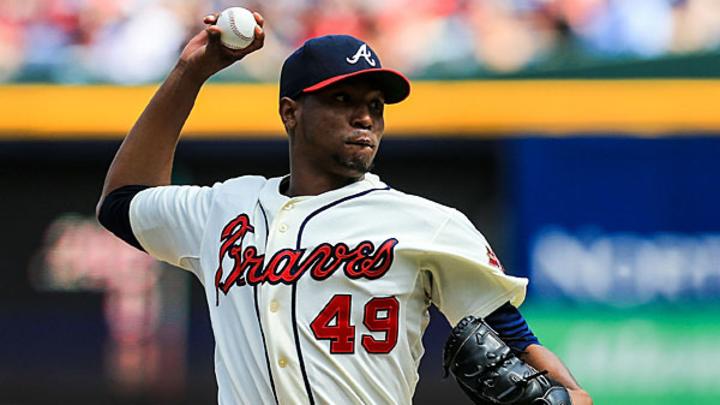Braves continue trend of extensions by locking up Julio Teheran

Atlanta has rewarded Julio Teheran for his long-awaited breakout season. (Daniel Shirley/Getty Images)

Julio Teheran spent four years on Baseball America's Top 100 prospects list before enjoying a breakout 2013 season. The Braves obviously liked what they saw, and now they've locked up the 23-year-old righty with a six-year, $32.4 million extension, a deal that includes an option for a seventh year. Though it obviously carries some risk, it's a smart move for cash-conscious Atlanta, particularly given the limitations on its finances and the way the free agent market for pitching has dried up.
The Colombia-born Teheran was considered by many to be one of the game's elite prospects; prior to both the 2011 and '12 seasons, he ranked fifth on Baseball America's lists. He made a total of seven appearances and four starts at the major league level in that span while spending most of those two seasons at Triple A Gwinnett, but his stock slipped considerably as he was tagged for a 5.08 ERA while repeating the level in 2012. Due to inconsistencies with both his breaking ball and his mid-to-high-90s fastball, he struggled to keep the ball in the park, and his home run rate rocketed to 1.2 per nine.
The Braves didn't lose faith; in fact they traded both Tommy Hanson and Randall Delgado last winter while penciling in Teheran for a spot at the back of their rotation. He stuck in the majors last season and he didn't disappoint. Thanks to an improved slider and an increased ability to generate groundballs, he turned in a stellar 3.20 ERA while striking out 8.2 per nine in 185 2/3 innings; though his home run rate was again a bit high (1.1 per nine), his low walk rate (2.2 per nine) helped to minimize the damage, and his 3.8 strikeout-to-walk ratio ranked ninth in the league. On June 5, he no-hit the Pirates for 7 2/3 innings before a pinch-single ended his bid to become the first Atlanta pitcher in 19 years to complete such a gem.
Teheran delivered quality starts in 60 percent of his outings, and thanks to judicious workload management on the part of the Braves, didn't need to be shut down late in the year. His September ERA (4.44) was worse than that suggested by his peripherals (3.36 FIP, with a 22/3 strikeout-to-walk ratio), but his .609 OPS allowed for the month was his second-lowest for the season. He did make an early exit in his lone Division Series start, but the Dodgers also steamrolled rotation-mate Kris Medlen elsewhere in the series as well. In most seasons, his overall performance would have been good enough for Rookie of the Year honors, but amid a bumper crop of young talent in the NL, Teheran finished a mere fifth in the voting behind Jose Fernandez, Yasiel Puig, Shelby Miller and Hyun-Jin Ryu.
That $32.4 million figure sounds like a lot of money, but that's an average of just $5.4 million per year for a potential frontline pitcher through his final two seasons before arbitration, his three years of arbitration eligibility and his first year of potential free agency. As FanGraphs' Dave Cameron pointed out, it's roughly equivalent to Madison Bumgarner's $35 million extension signed in April 2012, though that one didn't kick in for a year and thus officially didn't cover his $560,000 salary for 2012, and it also covered one more year of free agency. With recent research by ESPN's Dan Szymborski, the estimated the cost of a win on this winter's free agent market is around $5.45 million, so even without accounting for inflation, Teheran needs to be worth only around 1.0 WAR per year for the deal to break even. He was worth 3.2 in 2013, so even if he can't quite maintain that level, this should pay off.
Teheran's extension is the third that Braves general manager Frank Wren has completed this month, following those of Jason Heyward and Freddie Freeman. Heyward's two-year, $13.3 million deal covers his final two years of arbitration eligibility, while Freeman's franchise-record eight year, $135 million contract extends all the way into what would have been his fifth year of free agent eligibility. It's probably not a coincidence that these extensions are happening in the team's first offseason since hiring John Hart as a special advisor to Wren. As the GM of the Indians from 1992-2001, Hart pioneered the strategy of buying out key players' arbitration years, trading a bit of risk for cost certainty and thereby saving millions as the careers of stars like Manny Ramirez, Jim Thome, Kenny Lofton, Omar Vizquel and Sandy Alomar Jr. took off. Thanks to that nucleus, Cleveland won six AL Central titles and two pennants in seven seasons, and the strategy has spread, first to other smaller-market teams such as the Brewers, Royals and Rays and now to the point that it's industry-wide.
The Braves occupy a large market; the Atlanta metropolitan area is the country's eighth-largest, and the blackout area of the team's television rights covers not only all of Georgia but most or all of Louisiana, Mississippi and South Carolina, and parts of several other surrounding states as well. For all of that, the Braves are saddled with one of the worst television deals in the game; they're locked into rates between $20-$30 million per year until 2031, well below market. Because of that, they run a tight payroll. Last year's Opening Day tally was just $90.0 million (18th in the majors), and they'll likely be around that figure again. They haven't been above $100 million since 2008. It's their need to find additional revenue due to that TV shortfall and the inability to sell naming rights to Turner Field that's behind their shocking flight to a suburban stadium by 2017.
